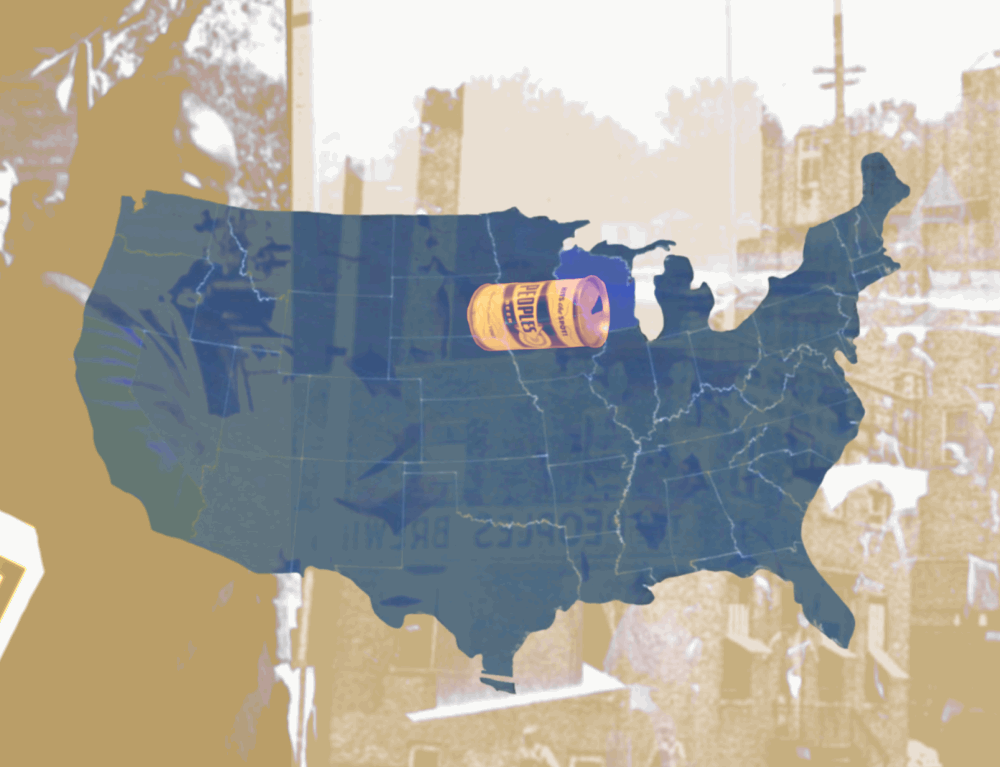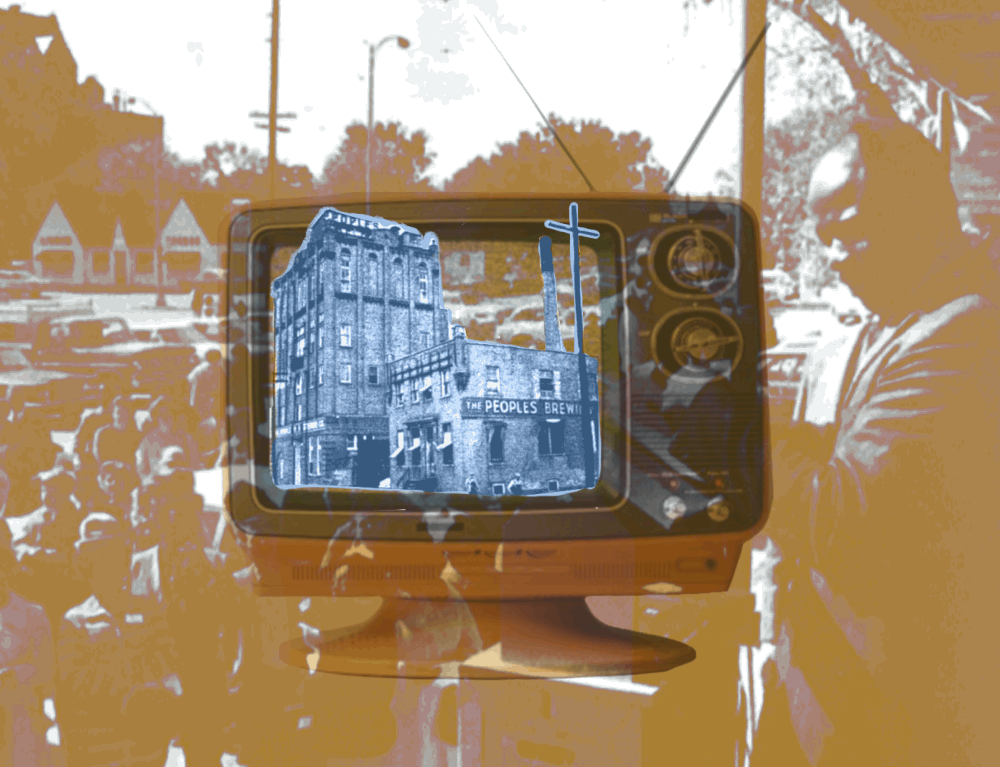Visit The Good Beer Hunting site
In August 2020, a legendary, long-extinct beer returned to the market—and it did so some 2,000 miles away from where it was born.
In 1970, a group of Black businessmen from Milwaukee purchased Peoples Beer—a brewery that was founded in the small town of Oshkosh, Wisconsin in 1913. When they did, Peoples became one of the first African-American-owned beer brands in the country. But that distinction was not to last: Ultimately, Peoples closed in 1972, following racist backlash, financial difficulties, and logistical challenges arising from ill-timed expansion. The brand has remained dormant since then, its storied past now found mainly in archives and the odd Oshkosh local’s memories.
 Or that was the case, until the brand was relaunched in Sacramento, California, nearly 50 years after its demise. This revival doesn’t just represent the unexpected third act for a historically significant beer—it also connects with the Black-led economic movement, focused on community empowerment through jobs and capital, that inspired Peoples’ former owners all those years ago.
Or that was the case, until the brand was relaunched in Sacramento, California, nearly 50 years after its demise. This revival doesn’t just represent the unexpected third act for a historically significant beer—it also connects with the Black-led economic movement, focused on community empowerment through jobs and capital, that inspired Peoples’ former owners all those years ago.
As someone who has researched Peoples’ history for the past few years, I was intrigued by this latest development in its story. Why did a beer brand that seemed inextricable from its Wisconsin origins find its relaunch opportunity so far from its home? How did the original Peoples Beer taste, and how does its contemporary recreation compare? And despite the distance, will this beer find its place in Oshkosh once again?
A CIVIL RIGHTS–ERA LEGACY In 1970, Theodore “Ted” Mack Sr. led a group of Black Milwaukee businessmen to purchase Peoples Brewing Company in the majority-white community of Oshkosh, about an hour away from Milwaukee. They did this not necessarily out of the desire to bring Black entrepreneurship to small-town, white America, but rather with the aspiration to own a brewery that could provide for the Black community. “Studies showed that Black people in this country are one of the largest consumers of beer,” Mack told Brewers Digest in 1970. “When I learned that, I decided that somehow, we were going to have to own a brewery.”
However, small breweries like Peoples were rapidly closing due to industry consolidation during this time period, and the brewery faced a number of existential challenges during its short second chapter.
Mack and company had tried to purchase a national brand, Blatz, a year earlier, but were stifled by the legal system that was mediating the transaction on behalf of Pabst Brewing, which was intent on keeping Black buyers out. Had Mack been successful in buying the Blatz brand, the story may have turned out differently. Alas, he and his associates had to turn to a small, regional brewery to continue their plan.
“Studies showed that Black people in this country are one of the largest consumers of beer. When I learned that, I decided that somehow, we were going to have to own a brewery.”
— Ted Mack, Brewers Digest, 1970Mack’s group was aided by the Nixon administration’s “Black Capitalism” minority business plan. Under this scheme, the loan to buy Peoples was backed by the Small Business Administration. Ted Mack’s expectation of this deal was that the government, as an interested stakeholder, would provide assistance and contracts with the military to sell beer. Records do exist of the SBA acting as a liaison between Peoples and the Department of Defense, but the response from the Marine Corps was that while opportunities were present for Peoples to sell beer to them, their purchases were restricted to brands that had “an acceptable level of customer demand to warrant stocking the item.” How was Peoples supposed to compete as a small, regional brewery in a setting where it had little to no brand recognition?
Peoples closed by the end of 1972. Though they pursued legal options against the federal government for breach of contract and conspiring with the larger breweries to keep them out, Mack and Peoples were unsuccessful in their claim, and the brand faded into obscurity, mainly remembered by Oshkosh residents.
That was the legacy of Peoples Beer for nearly 50 years. Apart from a few articles and TV features, the business was seen through a historical lens as a groundbreaking—but not necessarily trailblazing—brewery. Peoples existed in a time when beer was considered a manufactured product dominated by large corporate, white-owned entities. But even today, craft beer has very low diversity statistics, with the Brewers Association reporting in 2019 that only 1% of breweries are Black-owned.
In many ways, we’re still waiting for the moment that Mack worked towards to arrive, when Black entrepreneurs are able to provide for their community through the brewing industry. The former spokesperson for Mack’s group, Harold B. Jackson—in laying out their vision for the future of Black business in 1969—said, “We are selling an idea. An idea to mobilize Black people. Of all the major industries and corporations, Blacks own none. Black people must move into major business enterprises.” Mack reiterated that point, saying, “We can’t think about capitalism while we’re frying chitlins on the corner somewhere. We must have our own vehicle.”
PEOPLES BEER IS BACK...IN CALIFORNIA If you’d told him decades ago that Peoples would eventually be reborn in California, Ted Mack would likely have been skeptical. Sadly, Mack wasn’t around to witness it: After he passed away in 2019, the rebirth of Peoples has taken on an additional symbolic tenor for both the brand and the Mack family, which has helped negotiate the latest phase in Peoples’ existence.
“It’s history, you know, and actually getting to be a part of that and share the story of the beer, 50 years later, I mean—who gets that opportunity?”
— Rodg Little, Oak Park Brewing CompanyThe Mack family chose Oak Park Brewing Company in Sacramento as their partner for the relaunch. Oak Park Brewing is owned by a group of people, which includes local Sacramento brewery veterans Geoff and Becca Scott, restaurateur Dana Huie, and Kevin Johnson—a former NBA player turned Sacramento mayor turned entrepreneur. (It must be stated that Johnson faced allegations of sexual assault while mayor of Sacramento, and wasembroiled in a scandal over misuse of funds during the Obama administration.)
Johnson is the main reason that Peoples was reborn, according to OPB’s co-owner and brewer, Geoff Scott. “He personally reached out to Mr. Mack Jr., and he flew out a couple times to talk with him in Georgia and they just talked about life, dreams, everything that they could talk about … and they formed a very good relationship as people and friends. And then Mr. Mack agreed to partner with him to get the original recipe to the Peoples Beer and be able to produce it under the Peoples brand.”
 OPB’s location aside, the Mack family felt that it made sense as the brewery to relaunch Peoples. It markets itself as a brewery committed to community, and has released a number of beers designed to raise funds and awareness for social justice causes. In addition to taking part in Weathered Souls Brewing Company’s nationwide Black Is Beautiful initiative, OPB has also partnered with other Black-owned breweries in California to release a series of beers honoring Black leaders like James Baldwin, Fannie Lou Hamer, Ella Baker, and Fred Hampton.
OPB’s location aside, the Mack family felt that it made sense as the brewery to relaunch Peoples. It markets itself as a brewery committed to community, and has released a number of beers designed to raise funds and awareness for social justice causes. In addition to taking part in Weathered Souls Brewing Company’s nationwide Black Is Beautiful initiative, OPB has also partnered with other Black-owned breweries in California to release a series of beers honoring Black leaders like James Baldwin, Fannie Lou Hamer, Ella Baker, and Fred Hampton.
Today, Rodg Little, the company’s first hire, is among the few Black head brewers in the country. Of his experience brewing Peoples’ beer, he says: “It’s history, you know, and actually getting to be a part of that and share the story of the beer, 50 years later, I mean—who gets that opportunity?”
SMALL-TOWN ROOTS The storyline of Mack and Black capitalism looms large in Peoples’ history, and appropriately so. Mack was a Black leader in an almost entirely white industry, and he was the rare Black entrepreneur who owned the means of production. That Mack and his partners were able to do so in a small, white community is even more impressive. Certainly, the relaunch of the brand aims to celebrate that accomplishment. However, Peoples also has a long backstory that precedes the two years it was under Black ownership.
In 1894, in response to the economic hardship of the Panic of 1893, three of Oshkosh’s breweries joined forces to become the Oshkosh Brewing Company. This effectively monopolized the Oshkosh beer industry and forced tied-house tavern-keepers to bow to OBC as their sole supplier. The tavern-keepers were not keen on this relationship, however, and in 1911 met at the Revere Hotel and pledged their allegiance, and most importantly their capital, to a new cooperative brewery. They named their venture Peoples Brewing Company, and in a show of defiance, built their then-state-of-the-art brewhouse directly across the street from OBC.
“If you go to somebody in Oshkosh and you start talking to them about Peoples Brewing, Ted Mack is not going to be the first thing that comes to mind—you know, they’re going to talk about that their grandfather worked there, or their father worked there, or that beer was served in their family’s tavern, or that’s the beer their parents or grandparents drank.”
— Lee Reiherzer, Oshkosh historian and authorThe impact of Peoples on the marketplace was immediate. Peoples started production in 1913, and by 1914 OBC’s revenue was cut in half. Through the massive industry consolidation that followed Prohibition, Oshkosh’s breweries managed to fight off better-funded competition from the large breweries in Milwaukee, with Peoples and OBC leading marketing campaigns encouraging locals to support their neighboring breweries. For a time, it worked. But by the late 1960s, industry forces proved too powerful, and Oshkosh breweries were on the brink of closure. This led to the unlikely scenario of Ted Mack and his associates purchasing Peoples in 1970, and then purchasing the rights to all of OBC’s brands in 1971.
Oshkosh’s beer history is still visible in the city today, though most of Peoples’ and OBC’s facilities have since been demolished. However, memorabilia from OBC’s flagship brand, Chief Oshkosh, and Peoples Beer adorns the walls of many of the city’s breweries and taverns. There’s a certain nostalgia that surrounds these breweries, apart from their connection to the cause of economic civil rights, says Oshkosh historian and author Lee Reiherzer. “If you go to somebody in Oshkosh and you start talking to them about Peoples Brewing, Ted Mack is not going to be the first thing that comes to mind—you know, they’re going to talk about that their grandfather worked there, or their father worked there, or that beer was served in their family’s tavern, or that’s the beer their parents or grandparents drank.”
"HITS THE SPOT!" The roots of Peoples’ flagship beer originate from the brewery unveiling its new “Würtzer Beer” after Prohibition. At the time, the German name was meant to conjure images of beer’s heyday before the drought of Prohibition, though Peoples later dropped “Würtzer” amidst the rise of Nazism and World War II, when the product simply became known as Peoples Beer. Every can was graced with the tagline, “Hits the Spot!”
But what did it taste like? An advertisement from 1938 says that the beer has a “friendly old-time flavor and mellow smoothness.” Of course, this descriptor points more to the experience of drinking the beer than its flavor profile. This was common before the craft era, when beer was very much a manufactured product, sold more on consistency than bold new tastes.
 Luckily, recipes have survived the nearly 50 years since Peoples closed in 1972. Reiherzer tracked down one of Peoples’ former brewers, Wilhelm Kohlhoff, a few years ago. Kohlhoff worked at Peoples from 1953 until 1968. Reiherzer, who is also an avid homebrewer, had developed his own version of the Peoples recipe, and showed it to Kohlhoff. “He actually had the recipe, he had his handwritten notes, everything,” Reiherzer says. The beer is a Light American Lager, delicately hopped and using corn as an adjunct; maybe “mellow smoothness” is a good way to describe it after all.
Luckily, recipes have survived the nearly 50 years since Peoples closed in 1972. Reiherzer tracked down one of Peoples’ former brewers, Wilhelm Kohlhoff, a few years ago. Kohlhoff worked at Peoples from 1953 until 1968. Reiherzer, who is also an avid homebrewer, had developed his own version of the Peoples recipe, and showed it to Kohlhoff. “He actually had the recipe, he had his handwritten notes, everything,” Reiherzer says. The beer is a Light American Lager, delicately hopped and using corn as an adjunct; maybe “mellow smoothness” is a good way to describe it after all.
Reiherzer started to brew the recipe for local homebrew events, where he was regaled with tales by local residents of how they recalled the beer. Reiherzer then worked with Bare Bones Brewery in Oshkosh to reproduce the Peoples recipe for the first time commercially in 2019. The beer was a smash hit. “It was one of those things where you don’t get to have that kind of tangible, you know, tactile experience with history very often,” Reiherzer says. Unfortunately, Kohlhoff had died before the beer was released, so it became a celebration of his life’s work as well.
But for Oak Park Brewing’s Peoples relaunch, putting the original recipe back in service was no easy feat. The team wanted to bring the beer back with the recipe from Mack’s era, but the Mack family was having difficulty locating it in their dad’s files. Ted Mack Jr. is devoutly religious, however, and called upon a higher power for assistance. “He’s a man of the cloth, so he ended up praying, and like a day or two later it just popped up,” says Little.
While I wasn’t allowed access to the exact recipe at OPB, it also features a grain bill of six-row malt with a corn adjunct. One discrepancy is that OPB’s recipe only uses Cluster hops, while Kohlhoff’s version features later additions of Hallertau Mittelfrüh. This is also the difference between Reiherzer’s first version of the recipe and Kohlhoff’s recipe, coincidentally. Is it possible that the recipe was altered between the end of Kohlhoff’s tenure at Peoples in 1968 and the start of Ted Mack’s ownership in 1970?
The yeast is also historic to the brand, Scott says. “We had to contact Wyeast to bring it out of their archives so we could actually use the same yeast strain as they used back then.” The extra effort was worth it: The beer has been so popular at OPB that it replaced its other Pilsner-style beer, and Peoples has since become a flagship brand for the company.
GOING NATIONWIDE When Ted Mack became the principal owner of Peoples in 1970, he was set on making the beer a national brand, laying the framework to expand distribution into 111 different markets. This was a change in strategy for Peoples, which up to that point was a regional brewery mainly serving the thirsty population of northeast Wisconsin. In his attempts to expand distribution, Mack found that with a limited brewing capacity, such a plan wouldn’t be profitable. By that time, Peoples had fallen behind on its loan payments, and closure was imminent.
This time around may be different for the Peoples brand. There are plans for Oak Park Brewing to expand distribution across the country, meaning Wisconsin could once again see Peoples Beer on store shelves and at taverns. Right now, OPB is in talks with breweries about contract brewing the beer in Wisconsin, so their main Sacramento operation would not have to deal with the increased capacity. “I think probably in the next six months or so, you’ll probably see something pop up in Wisconsin, Chicago, or Detroit, or something in that area and then we’ll go from there,” says Scott.
Interestingly, a beer distributor in Oshkosh, Lee Beverage, may actually own the Peoples trademark. Apparently, in the 1970s and 1980s, John Kuenzl, whose family traces their roots back to one of the breweries that formed the Oshkosh Brewing Company in 1894, was buying up all of the defunct Oshkosh beer brands, with Peoples being one of them. Kuenzl was also the owner of Lee Beverage for many years. Current Lee Beverage owner Jeff Lindemann had seen the trademark in the company’s books, but finding further proof of the trademark ownership has been tricky. “It says it’s on the books … but I’m like, where’s the proof?” he says. “I was talking with our old accountant who’s retired, and no one could bring anything to me.” To stake their claim on the brand, Lee Beverage released private-label “Peoples Vodka” a few years ago, with the same logo style as the beer, and that’s the most that has been done with it.
Regardless of who actually owns the rights to the Peoples trademark, Lindemann says it’s a possibility that Lee Beverage could enter into a distributor agreement with Oak Park Brewing to bring Peoples back home to Oshkosh once more. Lindemann says, “We’re always willing to talk.”
Perhaps this will fit in with the large aspirations Ted Mack Jr. has for the new version of Peoples Beer. “It’s going to be worldwide and it’s going to finish a legacy. See, this is not something that’s rebirth,” Mack said on Instagram when the beer was relaunched. “This is really a new chapter, a continuation of a journey toward the promise. Because even Martin Luther King says, we shall get to the promised land. We can’t be hindered by the things that say we can’t do it, because we can do all things.”

 Words by John Harry
Words by John Harry
Illustrations by Colette Holston
More...
Or that was the case, until the brand was relaunched in Sacramento, California, nearly 50 years after its demise. This revival doesn’t just represent the unexpected third act for a historically significant beer—it also connects with the Black-led economic movement, focused on community empowerment through jobs and capital, that inspired Peoples’ former owners all those years ago.
OPB’s location aside, the Mack family felt that it made sense as the brewery to relaunch Peoples. It markets itself as a brewery committed to community, and has released a number of beers designed to raise funds and awareness for social justice causes. In addition to taking part in Weathered Souls Brewing Company’s nationwide Black Is Beautiful initiative, OPB has also partnered with other Black-owned breweries in California to release a series of beers honoring Black leaders like James Baldwin, Fannie Lou Hamer, Ella Baker, and Fred Hampton.
Luckily, recipes have survived the nearly 50 years since Peoples closed in 1972. Reiherzer tracked down one of Peoples’ former brewers, Wilhelm Kohlhoff, a few years ago. Kohlhoff worked at Peoples from 1953 until 1968. Reiherzer, who is also an avid homebrewer, had developed his own version of the Peoples recipe, and showed it to Kohlhoff. “He actually had the recipe, he had his handwritten notes, everything,” Reiherzer says. The beer is a Light American Lager, delicately hopped and using corn as an adjunct; maybe “mellow smoothness” is a good way to describe it after all.
Words by John Harry





 Reply With Quote
Reply With Quote